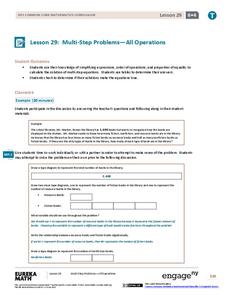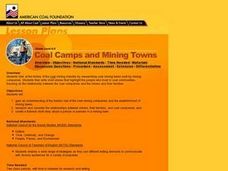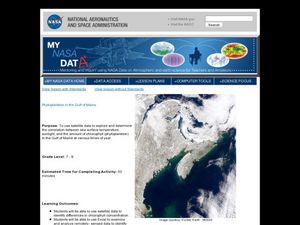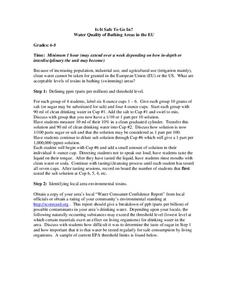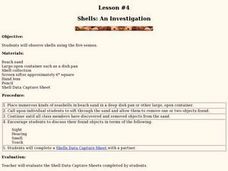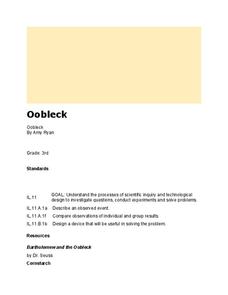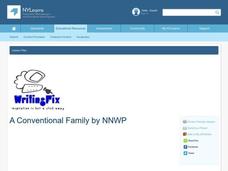Anti-Defamation League
What Is Culture?
Explore the complexity of culture with this rich and comprehensive lesson plan, which will prompt your learners to think critically and respectfully discuss our current definitions of culture, and how those definitions might...
EngageNY
Percent Error Problems
Individuals measure a computer monitor and determine how accurate their measures are. The eighth segment in a series of 20 introduces the concept of percent error. Pupils find the percent error of their measurements and discuss the...
EngageNY
Multi-Step Problems—All Operations
Harness the power of algebra to solve problems. Young mathematicians learn to work out multi-step problems by applying algebraic techniques, such as solving equations and proportions. They use tape diagrams to model the problem to finish...
Curated OER
Multiplication Snack Activity
Youngsters study multiplication facts by manipulating food in order to problem solve. They will use healthy snack items as manipulatives to solve various multiplication equations. Charts, tables, physical models, and so much more are...
Curated OER
Food Pyramid
Here is an engaging cross-curicular lesson plan which incorporates elements of language arts and heatlh. Groups of learners are assigned to one vowel sound. They work together to find pictures of food out of a booklet that have the long...
Curated OER
Making Simple Conversions
Young scholars explore the concept of measurement as it relates to equivalencies. They complete simple conversions using visual models of measurement units, and record their answers in a two-column table.
Maine Content Literacy Project
Introduction to Ernest Hemingway
What is a white elephant, and what does it have to do with Ernest Hemingway? Study "Hills Like White Elephants" in-depth by following the procedures outlined in this lesson, the fifth in a series of fourteen. Learners start the day with...
EngageNY
Describing Variability Using the Interquartile Range (IQR)
The 13th lesson in a unit of 22 introduces the concept of the interquartile range (IQR). Class members learn to determine the interquartile range, interpret within the context of the data, and finish by finding the IQR using an...
Curated OER
Coal Camps and Mining Towns
Young scholars should gain a better understanding of the processes involved in extracting coal from the Earth as a result of this lesson. They reearch the history of coal mining, look into coal mining towns, and create a short story...
Curated OER
Setting the Tone with Figurative Language
Explore figurative language with your secondary class. Extending a language arts unit, the activity prompts middle schoolers to examine how an author's word choice establishes a story's tone, possibly using metaphors, similes,...
Curated OER
Masks of Many Cultures: Celebrations of Life
Bring art and society together with this highly creative and interesting lesson. Learners research various uses of masks in ceremonies. They then create a ceremony of their own and a mask to go along with it. They film themselves...
Curated OER
Phytoplankton in the Gulf of Maine
Students use satellite data to see the correlation between sea temperature and sunlight in the Gulf of Maine. In this phytoplankton lesson students use Excel to analyze data.
Curated OER
Antibiotic Attack
Students examine how antibiotics work and why they are effective. For this antibiotic lesson, students discover that when harmful germs get inside the body, the immune system may not be strong enough to fight the germs off. ...
Curated OER
Creating a Character Chart for the Secret Garden
The Secret Garden, is a wonderful book to read with your class. After reading, why not employ the lesson plan presented here as a follow up activity? In it, pupils create character charts that portray the tremendous changes that...
Curated OER
Recognizing Litter
When does trash become litter? Use this litter awareness lesson to help them understand the importance of trash disposal. Get learners engaged by reading Nancy Loewen's Lady Lulu Liked to Litter (not included). After discussing what...
Curated OER
Discovering American Symbols
Help youngsters get to know their states and capitals, explore their own country, and study American symbolism. They take a "trip" across America collecting symbols, images, and information about each state as they go (through text and...
Curated OER
Is It Safe to Go In? Water Quality of Bathing Areas in the EU
Using your senses, apprehend the effects of contaminants in water. With a global focus, young scientists conduct a safe experiment by tasting sugar and salt water with different dilutions. After reviewing threshold limits, learners write...
Curated OER
Light
Light is such a fascinating subject. This lesson does a great job of illuminating the mysteries of light for your young scientists. A series of demonstrations which are explained in the plan should help your charges to understand how...
Curated OER
Galileo and the Inevitability of Ideas
Students research Galileo's work and contributions to science. They make a timeline of Galileo's life, discuss the historical context for his book "Dialogue on the Two Chief World Systems" and examine his trial by the Inquisition for...
Curated OER
CAN WE SWITCH GENDERS OF STORY CHARACTERS?
Analyze characters and stories to identify stereotyping. Learners will examine the concept of character gender to evaluate bias in classroom story books. They are asked to read a story or play and change the gender of the character to...
Curated OER
Shells: An Investigation
Learners observe shells using their five senses. In this scientific inquiry lesson, students examine shells using a hand lens and their five senses. Learners complete an included shell data sheet.
Curated OER
Oobleck
Students explore "matter." In this literacy and three states of matter activity, students listen to Bartholomew and the Oobleck by Dr. Seuss, then work in groups to explore "oobleck" (cornstarch and water mixture) with their five senses....
National Endowment for the Humanities
Thirteen Ways of Reading a Modernist Poem
High schoolers analyze modernist poetry and the role of speaker in example poems. Learners study modernist poems from the Romanticism and Victorian periods as well as Wallace Stevens' "Thirteen Ways of Looking at a Blackbird." Using a...
Curated OER
A Conventional Family
Young scholars explore writing techniques by analyzing their own families. In this family values lesson, students view the film "The Incredibles" in class and discuss the different types of modern-day families. Young scholars write about...


